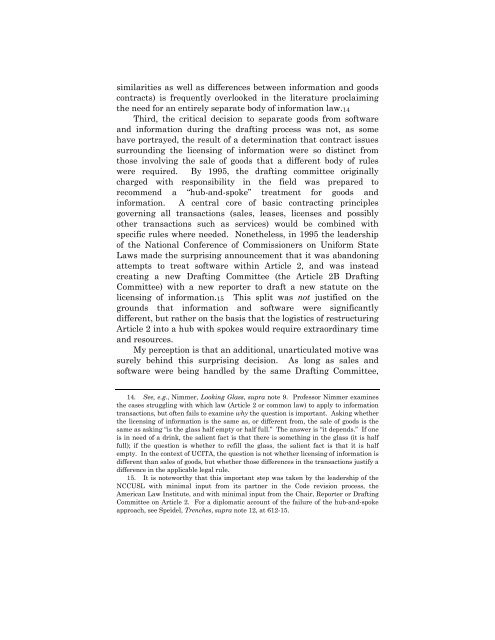Vol 7 No 1 - Roger Williams University School of Law
Vol 7 No 1 - Roger Williams University School of Law
Vol 7 No 1 - Roger Williams University School of Law
You also want an ePaper? Increase the reach of your titles
YUMPU automatically turns print PDFs into web optimized ePapers that Google loves.
similarities as well as differences between information and goodscontracts) is frequently overlooked in the literature proclaimingthe need for an entirely separate body <strong>of</strong> information law.14Third, the critical decision to separate goods from s<strong>of</strong>twareand information during the drafting process was not, as somehave portrayed, the result <strong>of</strong> a determination that contract issuessurrounding the licensing <strong>of</strong> information were so distinct fromthose involving the sale <strong>of</strong> goods that a different body <strong>of</strong> ruleswere required. By 1995, the drafting committee originallycharged with responsibility in the field was prepared torecommend a “hub-and-spoke” treatment for goods andinformation. A central core <strong>of</strong> basic contracting principlesgoverning all transactions (sales, leases, licenses and possiblyother transactions such as services) would be combined withspecific rules where needed. <strong>No</strong>netheless, in 1995 the leadership<strong>of</strong> the National Conference <strong>of</strong> Commissioners on Uniform State<strong>Law</strong>s made the surprising announcement that it was abandoningattempts to treat s<strong>of</strong>tware within Article 2, and was insteadcreating a new Drafting Committee (the Article 2B DraftingCommittee) with a new reporter to draft a new statute on thelicensing <strong>of</strong> information.15 This split was not justified on thegrounds that information and s<strong>of</strong>tware were significantlydifferent, but rather on the basis that the logistics <strong>of</strong> restructuringArticle 2 into a hub with spokes would require extraordinary timeand resources.My perception is that an additional, unarticulated motive wassurely behind this surprising decision. As long as sales ands<strong>of</strong>tware were being handled by the same Drafting Committee,14. See, e.g., Nimmer, Looking Glass, supra note 9. Pr<strong>of</strong>essor Nimmer examinesthe cases struggling with which law (Article 2 or common law) to apply to informationtransactions, but <strong>of</strong>ten fails to examine why the question is important. Asking whetherthe licensing <strong>of</strong> information is the same as, or different from, the sale <strong>of</strong> goods is thesame as asking “is the glass half empty or half full.” The answer is “it depends.” If oneis in need <strong>of</strong> a drink, the salient fact is that there is something in the glass (it is halffull); if the question is whether to refill the glass, the salient fact is that it is halfempty. In the context <strong>of</strong> UCITA, the question is not whether licensing <strong>of</strong> information isdifferent than sales <strong>of</strong> goods, but whether those differences in the transactions justify adifference in the applicable legal rule.15. It is noteworthy that this important step was taken by the leadership <strong>of</strong> theNCCUSL with minimal input from its partner in the Code revision process, theAmerican <strong>Law</strong> Institute, and with minimal input from the Chair, Reporter or DraftingCommittee on Article 2. For a diplomatic account <strong>of</strong> the failure <strong>of</strong> the hub-and-spokeapproach, see Speidel, Trenches, supra note 12, at 612-15.
















